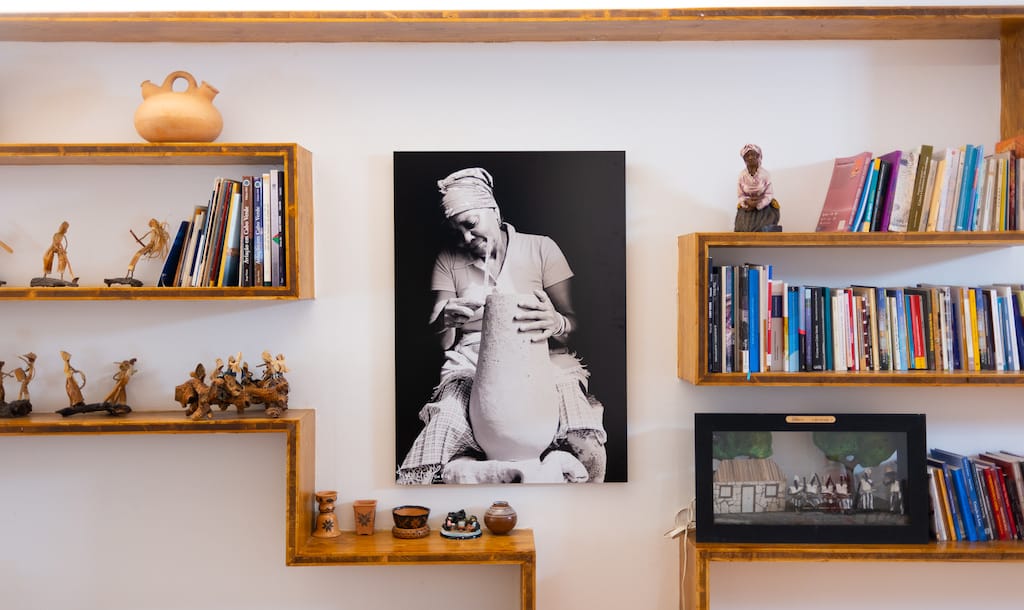Wandering around the neighborhood of Çarşamba, home to a famous weekly market and close to the sprawling Fatih Mosque complex, we get the distinct impression that this area is honey central: the streets are lined with shops selling the sweet nectar, particularly stuff coming from the Black Sea region. “This area is full of honey sellers,” Aslan confirms on a cold November afternoon after we took refuge in his store, Balmerkez, “but there is no place like this.”
He’s right – there’s something about his storefront that we found particularly appealing on that cold day. Perhaps it’s because Aslan’s little shop looks more like an atelier than a commercial outlet. Pots, containers, glass jars and wicker baskets are stacked high on the shelves – a honey lab may be a more fitting description.
A tall, thin man in his 50s, Aslan has a clear passion for the stuff; it spills out as he regales us with stories about trips to the mountains to collect herbs and meet producers. “I have always loved exploring the mountains, both around Istanbul and in other regions, usually with a group of friends,” says Aslan, whose family comes from the eastern Anatolian town of Tunceli, even though he was born and raised in Çarşamba. “That’s how I first became interested in the production of honey and, more generally, in awe of the amazing gifts nature has to offer us.”

Around 15 years ago, he decided to transform his passion for honey into his job after realizing that he had inadvertently created a small network of producers, most of whom he had met and befriended on his personal trips to the mountains.
Although we tend to associate honey with desserts or sweet treats, Aslan stresses that it is much more than a sweetener. In Turkey, one of the best cures for a sore throat is honey with ground dried ginger (anyone who has spent time with a Turkish teyze, or auntie, while sick knows this well). But it goes beyond mere flu medicine. “Honey, and actually all products made by bees, can be used in a thousand different ways to take care of our bodies,” explains Aslan while handing us small spoonfuls of dripping ambrosia taken from the jars around us. “Apart from strengthening our immune system, honey, propolis [a glue-like compound made by bees] and royal jelly can be mixed and matched in a number of different ways to heal our heart, our blood, and even our skin.“
Like an old-time apothecary, Aslan mixes many different elixirs with the raw materials he has at hand. He shows us a thick brown paste made with a blend of raw propolis and pollen: “Perfect to strengthen your body when you’re sick or when your energy levels are low because of illness or poor nutrition,” he says. “Propolis is a type of resin that bees also use for curative purposes, to take care of ill bees, as well as an insulating material for their little homes.”
“Honey, and actually all products made by bees, can be used in a thousand different ways to take care of our bodies.”
Pouring honey into a jar with powdered pollen, Aslan produces a yellow molasses – its color so bright that it’s hard to believe it’s 100 percent natural. “Pollen is full of good nutrients such as B group vitamins, that help keep our natural defenses high; moreover, it’s really useful to help kids grow strong and healthy. Moms often use it to nourish their kids in a delicious but healthy way,” he explains.
We notice some empty jars with the label HZN4001. “This is our brand – even though I don’t like brands,” says Aslan. “The name comes from Mount Hizan, a 4,001-meter mountain close to the northeastern Turkish province of Bitlis where my friends have bees and produce the delicious honey we’ve been tasting.”
As we chat, people from the neighborhood come in to pick up their orders, be it molasses, essential oil, or some special mixture made with bee products. It seems like this spot is a sanctuary of sorts, one where everyone can find their healing potion. And just like a guru, Aslan silently listens to his customers’ needs, advising them or simply (and, still, silently) starting to mix up some of his carefully stored ingredients.
Aslan’s wife, Zeynep, also plays an active role in this creative family business: she produces a miraculous mixture made with a couple drops of essential oils and natural wax made by the bees. “This lotion not only rejuvenates the skin, but most importantly it’s very beneficial for people with scars or skin problems. We have had many soldiers wounded in eastern Turkey come here to get this cream, as well as patients who have skin issues or scars from diabetes. It helps the skin to rebuild itself,” Aslan tells us.

Around the tiny room, we spot several vases and jars with labels written in foreign languages. “These are the foreign types of honey that my friends bring or ship to me from all over the world. I have some from Germany, as well as from Moldova, Yemen, even Morocco, because once people hear about the shop, they start coming from different parts of the world and become loyal customers,” explains Aslan. “We then begin exchanging honeys and become friends – we can talk for hours about bees.”
This apparently anonymous store in a traditional neighborhood may be, unexpectedly, the most multicultural spot for blocks. And not only thanks to its foreign customers and suppliers – we can’t hide our surprise when Aslan shows us one of his main sources of knowledge, Health Through God’s Pharmacy. This book – a classic written by the Austrian herbalist and writer Maria Treben in 1980 – is clearly well-worn: it has been read and re-read, consulted while preparing some herbal mixture, and perhaps even carried in a backpack during a trip to the mountains.
On our way out the door, we notice a sticker in red letters reading “Bal şifadır” (a Turkish expression meaning “Honey is a cure”). “This is from the Quran,” Aslan explains. “Honey is like a sacred food for your health and your soul,” he adds.
The secret to a better life, it would appear, is to follow the bees.
Lorenza MussiniVicente Chapa Pratz
Published on January 09, 2019
Related stories
June 22, 2023
LisbonOne of the joys of Lisbon’s food scene is the access it allows to cuisines from across the Lusophone world. And one of the most represented is the food of Cabo Verde (formerly known as Cape Verde), an archipelago of 10 islands off the western coast of Africa. Its ubiquity is due to immigrants from…
October 1, 2019
MarseilleQuick Bite: Join this epic food tour in Marseille to discover the diverse flavors, people and places that make this vibrant port city so irresistible. Though the capital of Provence and France’s 2nd-largest city, Marseille proudly grooves to its own Mediterranean beat – a mash-up of big-city grit and small-town sociability mixed with seagull squawks…
August 31, 2012
IstanbulEditor’s note: We regret to report that Vonalı Celal and Ahırkapı Balıkçısı are closed. Call it the Sultanahmet Squeeze: How to stay close to the monuments of the Old City yet avoid eating in tourist traps? We get asked this question a lot. Since the Sultanahmet area is primarily a tourism zone, locals-only haunts are…



















































































